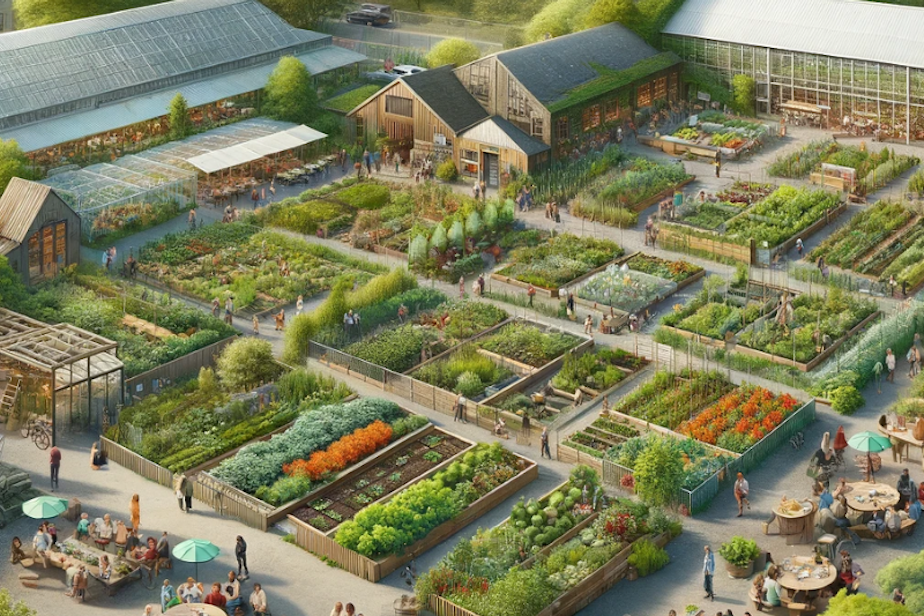What's behind Molbak's return as the 'Green Phoenix Collaborative'

When Molbak's Garden and Home ceased operations in January, it was a shock to Woodinville's green thumb community. When owners announced that the business would return, but as an entirely different operation, it came as yet another shock — and a point of confusion.
What is the "Green Phoenix Collaborative?"
"I don't mean to sound kind of, you know, overly altruistic, but it is really something that we're doing for the community," Molbak's CEO Julie Kouhia told KUOW. "We think that it is a great thing for the community. … The reason that we would do this is because people were excited about it and people wanted it to happen. And if they don't, then we won't do it.”
RELATED: Molbak's from the dead in Woodinville
Molbak's remains a business. But moving forward, it won't be a retail operation like it had been for nearly 70 years. Owners have envisioned a new business model: the Green Phoenix Collaborative. Think of the collaborative like a host of the site, allowing "partnerships" to operate there — people and organizations using the land for community gardens, event space, classes, entertainment, art events, and other gardening-related activities. It depends on who steps up to participate.
Kouhia said she wants it to be a place "where kids can get off their iPhones and come in and learn how to do something to help combat climate change."
Mobalk's plans to charge little-to-no rent for participants to operate there. It's now asking for contributions via Indiegogo to help get the collaborative up and running. Green Phoenix Collaborative aims to raise $2.5 million by May 9. It costs about $1 million to maintain the property for one year. The other $1.5 million will be put toward hiring a small team and managing a website (the collaborative wants to offer online classes and podcasts). It will also be spent to support "partnerships and prepping space for folks to cohabitate," Kouhia said, adding that she hopes to break even in the end.
Why the change?
Molbak's was a community hub in Woodinville for decades. In 2008, the business sold its property to a developer, Green Partners, with the idea that the area would be developed into something new, with Molbak's included. Green Partners became the landlord of the property, and Molbak's worked with the developer for more than 10 years on the future project. Kouhia said the result would be a model for other cities to copy, with gardening and green space between buildings.
But in late 2023, a rift emerged between the two parties. While she was tight-lipped about details, Kouhia said Molbak's wanted to build its new retail operation on a new plot, while continuing to operate on its old property. When construction was finished around 2026, the business would have moved over. After going through mediation in December, Molbak's opted to shut down its business in January 2024.
RELATED: Spring gardening will be a little unique in 2024. What Ciscoe Morris says you should know
Now, the Green Phoenix Collaborative will operate on Molbak's original plot of land. The developer remains the landlord.
"We are planning to, and expecting to, be on the land, in our buildings, for the next couple of years. We are not able to function as a large-format retail garden center, which is what we had been," Kouhia said, adding that she would love a retail operation included in the collaboration, but it won't be Molbak's.
"Beyond retail, we could see ourselves ... partnering with people to do education programs and workshops. And there could be nonprofits operating out of this space," she said. "There's beautiful spaces for innovation. In the back, we have a huge open area that we could turn into community P-patch gardens, for the apartments behind us and people in Woodinville."
While the collaborative is currently planning to operate over the next two years out, Kouhia said this is a "long-term plan."
"I can only look at the things that I can control right now. So I would launch it here, I would grow it here, and I would prepare to move it elsewhere," she said. "If the landlord changed their mind, that would be fabulous, but I think that that is not within my power, to make that happen.”
"It is just really sad to be in all these greenhouses without any plants," Kouhia added. "If I am here next year, at this time of year, it is going to be bursting with plants and flowers and activity. And people teaching people about plants, and people learning how to garden. That's my dream, but it's really at the moment you can really feel the loss at this time. So, my goal is to reverse that, and make lemonade out of lemons, and plant something that can grow far into the future."


